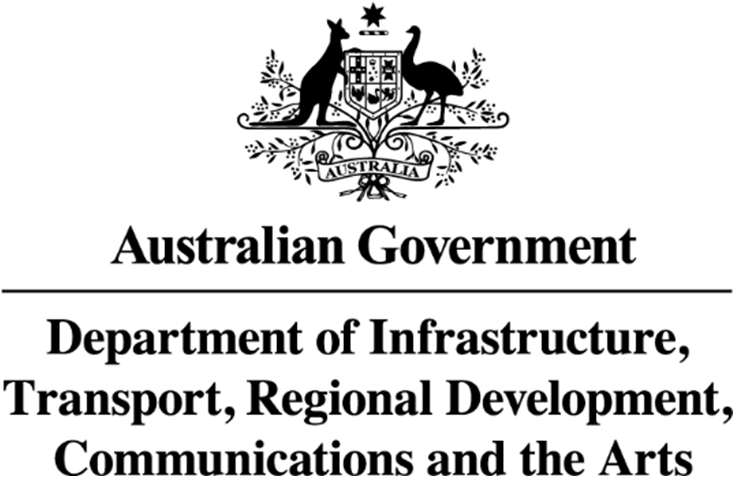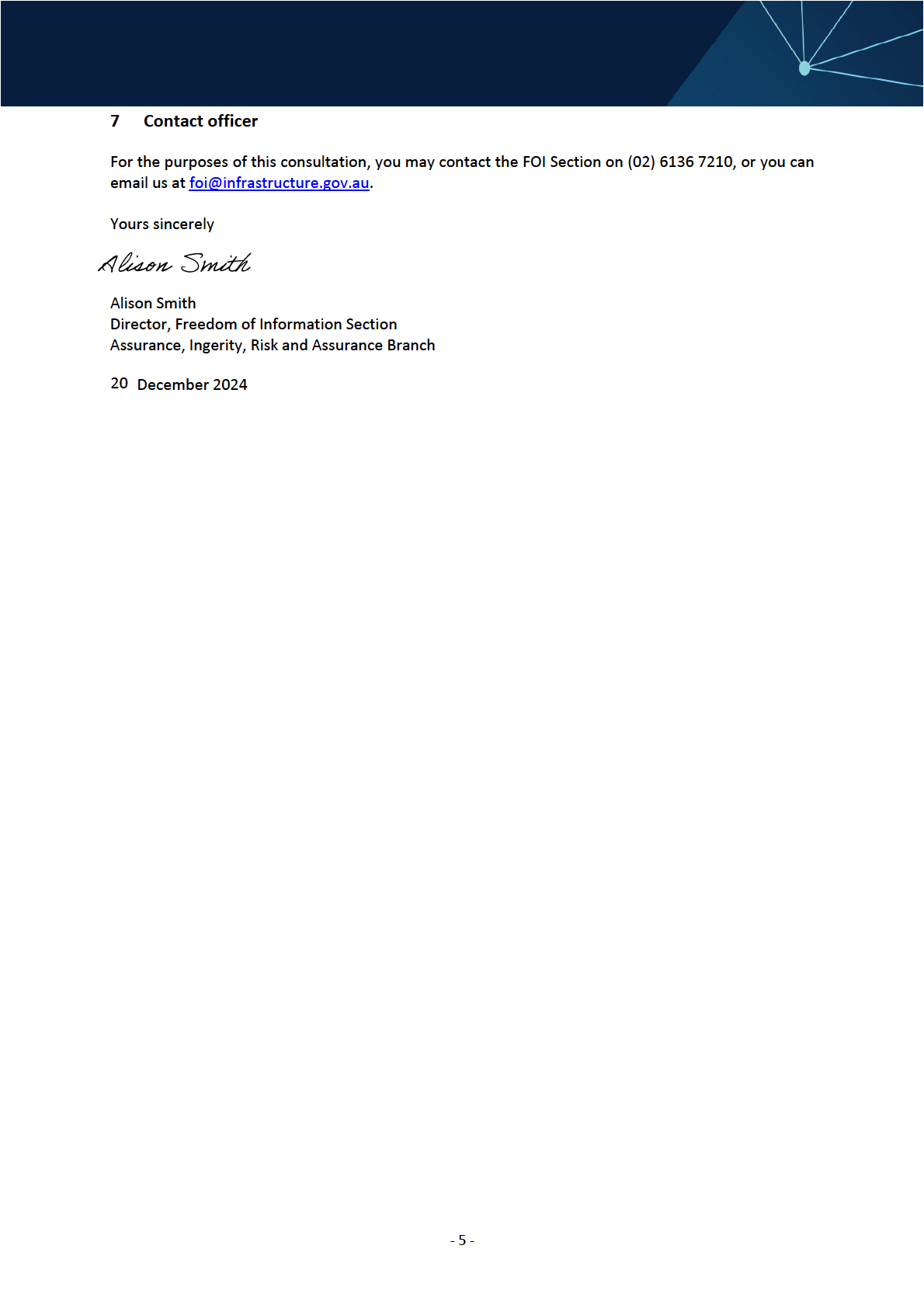
Our Reference: FOI 25‐217
Noseyrosey
By email: foi+request‐12604‐xxxxxxxx@xxxxxxxxxxx.xxx.xx
Dear Noseyrosey
Freedom of Information Request FOI 25‐217 ‐ Notice of Practical Refusal
I refer to your request of 14 December 2024, received by the Department of Infrastructure, Transport,
Regional Development Communications and the Arts (the department), seeking access to the following
documents under the Freedom of Information Act 1982 (FOI Act):
Access to any and all documents, records, data, and supporting material held by [Name of
Agency] concerning the sharing of personal information originating from the Department of
Veterans’ Affairs (DVA) over the last ten years. This includes any data transfers from or to the
DVA, whether they were one‐off exchanges or ongoing, systematic transfers of DVA client
information, including personal, medical, financial, or service‐related details concerning
veterans or their dependents.
I am interested in obtaining a comprehensive understanding of what DVA client information
[Authority name] has received or accessed and for what purposes. Specifically, I request:
All records of data sharing arrangements between DVA and [Authority name], including but not
limited to memoranda of understanding, service‐level agreements, emails, letters, meeting
minutes, file transfer logs, internal reports, and instructions that outline what data was shared,
when it was shared, and the format or system used for the transfer.
Any policies, procedures, guidelines, or frameworks that govern how [Authority name] requests,
obtains, stores, handles, or uses DVA client information. This includes documents that detail the
criteria for approving access to such data, any consent or authorization processes, security
controls, and retention or destruction policies.
Copies of any ethics committee approvals, privacy impact assessments, internal review board
decisions, or other documents that reflect deliberations or authorizations for obtaining DVA
client information. This includes records that show the agency considered the ethical, legal, or
privacy implications of receiving or using DVA client data.
Documents that outline the intended uses or practical applications of the DVA client data, such
as project proposals, business cases, internal strategy papers, or briefings that explain why
[Authority name] sought access to this information, how it was intended to be integrated into
the agency’s operations, and any expected outcomes or benefits.

A representative sample (in a suitably de‐identified or redacted form) of the data or data fields
received, so long as providing this sample does not breach any exemption under the FOI Act.
The purpose is to understand the nature and granularity of the information shared, without
disclosing identifiable personal details.
If the only data [Authority name] received pertains solely to data linked to the Centrelink
Confirmation
eServices
(CCeS)
arrangements
as
described
at
https://www.servicesaustralia.gov.au/centrelink‐confirmation‐eservices‐cces, and there were
no other forms of DVA data shared, then no CCeS‐related data needs to be provided under this
request.
1
Practical Refusal
Section 24AA of the FOI Act provides that a
practical refusal reason exists in relation to a request for a
document or either (or both) of the following applies:
(a) the work involved in processing the request would substantially and unreasonably divert
the resources of the agency from its other operations;
(b) the request does not satisfy the requirement in paragraph 15(2)(b).
I am writing to tell you that we believe the request does not satisfy the requirement in
paragraph 15(2)(b) and as a consequence the work involved in processing your request in its current
form would substantially and unreasonably divert the resources of the department from its other
operations due to its broad scope and subsequent size and complexity. This is called a ‘practical refusal
reason’ (section 24AA).
On this basis, we intend to refuse access to the documents you requested. However, before we make
a final decision to do this, you have an opportunity to revise your request. This is called a ‘request
consultation process’ as set out under section 24AB of the FOI Act. You have 14 days to respond to this
notice in one of the ways set out below.
2
Why I intend to refuse your request
I consider that a practical refusal reason exists in relation to your request for the reasons set out below.
While your request characterises in general terms the information you seek to access, it has not
identified any specific documents, or any individuals or indeed business areas within the Department
who may hold documents which would be relevant to your request. As such, your request is
considerably broad in nature, and will require a vast range of searches to be undertaken.
Because of the broad nature of your request, and the lack of specificity around the documents you are
seeking to access, the department’s decision maker would also be required to exercise a subjective
assessment of any documents captured by your request to determine if they were actually the
documents being requested by you.
I note that the Administrative Appeals Tribunal has previously agreed1 with the proposition that an
agency does not have to exercise a subjective judgement as to the nature of the document an FOI is
requesting access to.
1 ‘SB’ and Services Australia (Freedom of information) [2020] AICmr 18 (1June 2020)
‐ 2 ‐
 2.1
Search and retrieval
2.1
Search and retrieval
For the department’s decision maker to be satisfied beyond doubt that all relevant documents have
been identified, they would need to consult with every single member of staff within the department
to seek confirmation as to whether that staff member holds relevant documents. As at 30 June 2024,
the department had a workforce of 2,290 ongoing and non‐ongoing APS staff.
On the basis that each individual member of staff would require a minimum of
1 hour to undertake
the necessary search and retrieval work outlined above, I estimate that the department would require
a minimum of
2,290 hours to search for and retrieve documents containing material potentially
relevant to your request.
On this basis, I consider that a practical reason exists in relation to your request.
2.2
Summary
While the department does not consider you have provided sufficient information, at this point in time,
for the decision maker to be satisfied that they are able to identify all documents relevant to your
request, I estimate that it would take the department a minimum of
2,290 hours to ensure due
diligence has been exercised in the search for documents alone.
2.3
Conclusion
In considering whether this would constitute a substantial and an unreasonable diversion of resources
of the department, I have taken into consideration the following factors:
the staffing resources available to the department for FOI processing and the fact that, at this
point, the entire Department would be required conduct a search for relevant documents
whether the processing work requires the specialist attention of a senior officer, or can only
be undertaken by one or more specialist officers in the department who have competing
responsibilities
the impact that processing this request may have on other work in the department.
In VMQD and Commissioner of Taxation (Freedom of information) [2018] AATA 4619 (17 December
2018) [101] the AAT noted:
What constitutes valid practical refusal grounds is thus agency specific and resource dependent.
Nevertheless for any agency, a burden in excess of 200 hours would almost certainly make the
threshold of a rational and objective test. As is illustrated above, burdens as (relatively) small as
74 hours have been so characterised.
As such, I am satisfied that the work involved in processing your request, as currently presented, would
substantially and unreasonably divert the resources of the department from its other operations.
3
Request consultation process
You now have an opportunity to revise your request to enable it to proceed.
Revising your request can mean narrowing the scope of the request to make it more manageable or
explaining in more detail the documents you wish to access.
‐ 3 ‐

For example, you may need to provide more specific information about exactly what documents you
are interested in to enable us to be able to pinpoint the documents more quickly and avoid using
excessive resources to process documents you are not interested in. This more accurate information
would also remove the need for a decision maker to exercise any subjective assessment of the nature
of the documents you are seeking to access.
The department’s organisational chart is available on the department’s website here:
www.infrastructure.gov.au/department/our‐organisation#org. This may assist you to identify which
functions of the department you may wish to focus on in relation to your request.
For the purposes of assisting you, the following suggestions are provided for your consideration if you
choose to revise your request:
Specifying a narrower date range
Specify documents held by particular areas of the department detailed in the organisational
chart
Provide a detailed description of the subject matter and its relationship to departmental
functions and responsibilities
4
Next steps
Before the end of the consultation period, you must do one of the following, in writing:
withdraw your request
make a revised request
tell us that you do not wish to revise your request.
The consultation period runs for 14 days and starts on the day after you receive this notice. Please note
that the time taken to consult you regarding the scope of your request is not taken into account for the
purposes of the 30‐day time limit for processing your request.
During this period, you are welcome to seek assistance from the department’s FOI Section. If you revise
your request in a way that adequately addresses the practical refusal grounds outlined above, we will
recommence processing it.
If you do not do one of the three things listed above during the consultation period or you do not
consult us during this period, your request will be taken to have been withdrawn.
5
Legislative provisions
The FOI Act, including the provisions referred to above, are available on the Federal Register of
Legislation website: www.legislation.gov.au/Series/C2004A02562
6
Further information
Information and data on the department’s workforce is available on the Department’s website:
www.infrastructure.gov.au/sites/default/files/documents/2023‐24‐annual‐report‐for‐the‐
australian‐government‐department‐of‐infrastructure‐transport‐regional‐development‐
communications‐and‐arts.pdf
‐ 4 ‐





